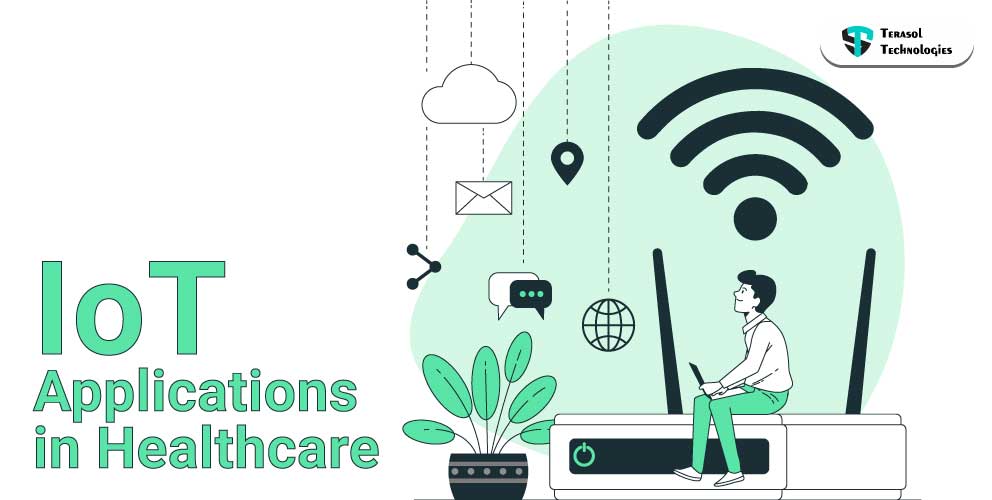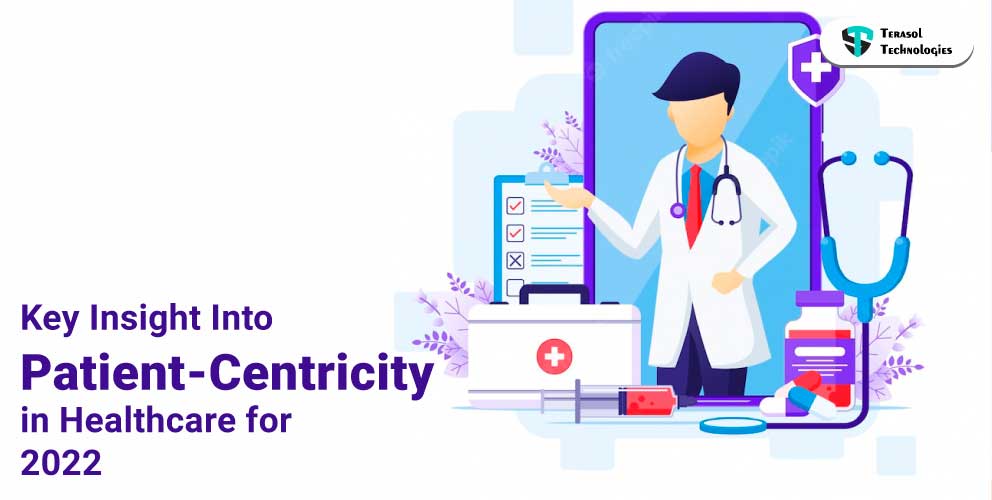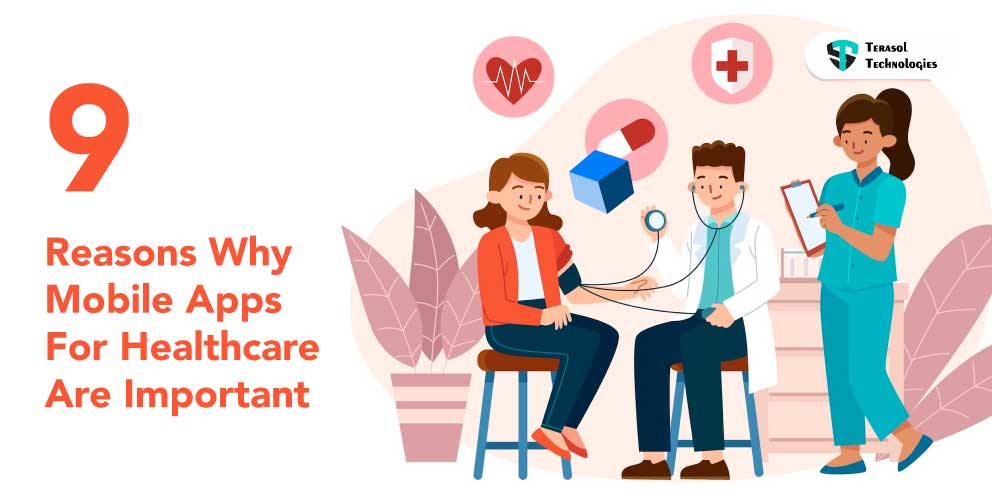Effective Custom Healthcare Software Development in 2022
Technological advancement is not stepping in almost every industry all over the world. The global pandemic has refocused our attention on the healthcare system. The healthcare industry is one of the most crucial sectors in the global economy.
According to a study conducted by Deloitte Global Health Care Outlook report, the global healthcare sector is currently huge and is worth $7.724 trillion. However, it is anticipated that it will grow much more in the coming years, with a 5.8% increase to 19.3 billion dollars by 2025. All the organizations that provide clinical services, health-related assistance, drug, and medical equipment development are included in the healthcare market. It's no wonder that the need for custom healthcare software development services from web application development companies is growing with each passing day.
Custom Healthcare Software Development
Software development for healthcare systems creates a whole ecosystem that improves the quality and accuracy of healthcare services. Custom healthcare software development encompasses a wide range of activities aimed at resolving issues within healthcare organizations as well as caregiver-patient relationships. Machine learning, Big Data, and e-health are examples of technology advancements that can improve the patient experience and the equipment used.
Benefits of Software Development in Healthcare System:
- Patient records may be accessed quickly from inpatient and remote locations, allowing for better coordinated and efficient care.
- Clinical notifications, reminders, and medical information have all been improved.
- Filling out the same forms at each office visit is no longer necessary.
- Labs, registries, other EHRs, and HIEs are all interfaced with.
- Tools for enhancing performance and real-time quality reporting.
- Documentation that is legal and complete, allowing for appropriate classification and billing.
- E-prescriptions are convenient because they are transmitted to the pharmacist electronically. Electronic referrals make it easy to get specialist follow-up care.
- The latest options, such as cloud computing systems and SaaS-enabled EHRs, allow enterprises to access all of these valuable services at their leisure and from any location.
- The ability to manage the industry from any location and improve the efficiency of each healthcare process.
🔖Bring Digital Revolution to Life Science Industry with our services.
Types of Healthcare Software Development
IT and healthcare integration has opened the road for effective treatment.
Let's see a few types of software development shaping up the healthcare industry:
1. Electronic health record (EHR) software:
This software from custom software development company manages and maintains complete patient information such as medical history, allergies, lab results, demographics, accounting finances, and more.
2. Medical Practice Management Software or MPMS:
Medical service providers can use MPMS to keep track of patient information and payment details. This technology is needed to keep clinical workflows running smoothly and to improve day-to-day operations. Patient data and medical information are saved electronically, making it easier to keep track of a patient's health. Medical professionals have quicker access to patients' data, and patients don't have to worry about keeping their medications safe.
3. Medical diagnosis software:
Medical diagnosis software is system software that uses artificial intelligence to conduct diagnostic procedures with precision. The purpose of this software system is to automate and link the medical diagnostic process to ensure that diagnostic results are as accurate as possible.
4. E-Prescribing Software:
It allows patients to electronically communicate prescriptions with pharmaceutical companies. It strengthens links throughout the healthcare profession and, above all, supports the comfort of patients.
5. Medical equipment management software:
Medical equipment management software is to maintain track of the service history of surgical equipment, dialysis machines, equipment, and other items. It helps in reducing the chance of treatment interruptions, improves the cleanliness of the facilities, minimizes equipment downtime, schedule sterilization procedures, and keep a regular check on supplements to get rid of old drugs and load up on the tools you need.
6. Urgent Care Applications:
This category of healthcare software includes several apps that allow users to seek emergency attention without having to go to the doctor's office. In the event of an emergency, it also allows a patient to bypass the waiting room and speak immediately with a doctor. It features live video sessions where a patient can connect with a doctor and exchange their medical information. It makes the healthcare industry available 24 hours a day, seven days a week, regardless of location.
7. Hospital Management Software:
This software helps hospitals run more efficiently. Hospital Management Software includes the billing process, insurance assignment, patient information management, medical staff details, and all other administrative tasks.
8. Healthcare CRM:
Healthcare CRM software's major goal is to improve client relationships, which entails better service, contact management, and accurate performance reports.
Certain technology advancements will modify traditional medical software development and respond to the healthcare system's new needs.
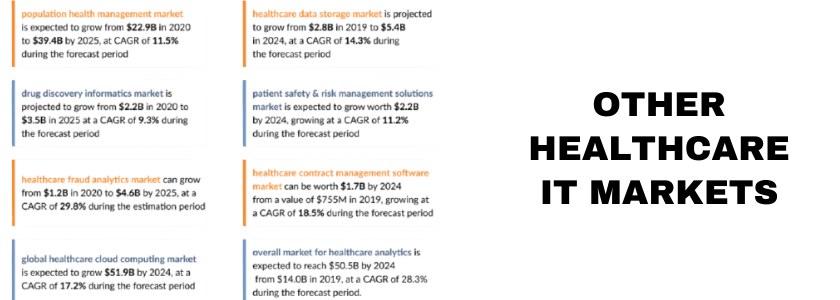
Healthcare Software Technology Trends
Telemetry and remote monitoring
This technology not only aids those in need of medical care but also adds an aspect of greater quality and speed, allowing medical processes to be streamlined. Patients who previously required continual medical supervision will be able to be at home while still receiving prompt medical care thanks to telemetry.
Telemedicine
Telemedicine is used to improve clinical workflow and reduce the need for patients to attend the hospital unless they are in an emergency. It helps to boost access to care and reach more patients by lowering patient no-shows, reducing the need for non-emergency visits to clinics and ERs during the pandemic, and improving clinical workflows and efficiency.
The global telemedicine market was valued at USD 38,289 million in 2020, with a CAGR of 28% predicted during the forecast period (2021-2026).
IoT and IoMT
With the advancement of telemedicine and telehealth comes the rise of IoMT (Internet of Many Things) development in the field of medicine. It combines the usage of numerous wearables, such as ECG and EKG monitors, to cover some of the most frequent medical data, including skin temperature, glucose level, and blood pressure readings. Medication management, connected imaging, remote patient monitoring, fall detection, and more segments have been created within the industry.
Chatbots
Many sectors have already embraced chatbots and reaped the benefits. Healthcare, on the other hand, is only now beginning to grasp the potential benefits of chatbots in the field. The following are some examples of use cases: checking symptoms; medical and pharmacological information; appointment scheduling and monitoring, etc.
AR/ VR
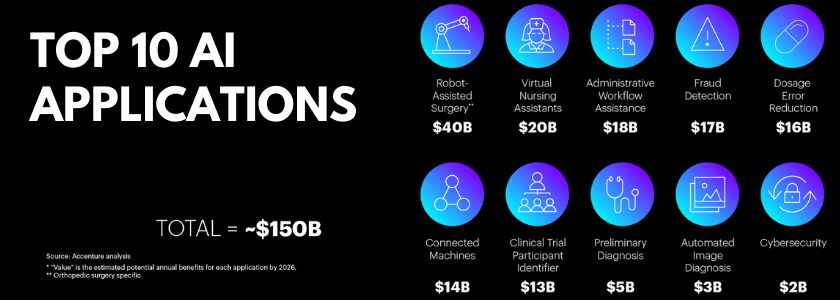
Universities and training institutions can increase the quality of medical education and practice by implementing modern VR and AR technology. They also assist clinics in providing comprehensive patient care, including medical rehabilitation, consultation, and diagnosis.
Digitize your healthcare business with our cutting-edge life-science development services.
Custom Healthcare Software Development Process
The steps for heading the medical or healthcare software development process are as follows:
- Choose a target audience based on their tastes, preferences, and normal behavior.
- Create a clear vision and requirements of healthcare IT solutions that match the needs and wants of your target audience by sketching the software architecture.
- Development of prototype to find a raw solution.
- Establishing programming, and other architectural development of software.
- Detailed UI/UX design- the tailored solution necessitates a greater focus on the app's usability and intuitiveness.
- Software testing and software adjustments.
- Secure the technology by using encryption to protect data.
- Integrate the software – a customized solution is always a part of the whole software infrastructure and assembling it.
Healthcare Software Solutions can be classified into:
- For Doctors: Medicine prescriptions, patient visits, and personnel communication are all automated for doctors.
- For patients: It will have the ability to schedule appointments online, see laboratory results, and receive push notifications.
- For clinics: Control over funds and equipment, service quality, and data flow are all important factors.
- For individual self: Fitness and nutrition tracking applications for self-care to assist people to maintain a healthy lifestyle.
- For health management: The collection of mobile health apps that help track key bodily metrics and treatment progress.
Need of Custom Healthcare Software Development Companies
The primary motivation for medical institutions to implement IT solutions is to save money. A hired software development business should, among other things, handle the problem of increased financial efficiency through cost optimization.
To give the most accurate result and assure client satisfaction, healthcare software development businesses mostly focus on task-oriented solutions. Nonetheless, the ultimate goal of any technological advancement is to create an all-encompassing healthcare environment.
Healthcare software development companies provide three categories of services:
- Healthcare software: All technologies are targeted at supporting data administration and enhancing care quality.
- Healthcare apps: These are smartphone applications that track and communicate about a person's health status or apps like e- pharmacy.
- Custom solutions: Task-oriented software or a mobile solution tailored to a customer's individual needs.
As a result, a high-end software development business will always provide a full range of services to healthcare enterprises, including IT consulting, mobile/web development, cloud technologies, and IT outsourcing.
Custom Healthcare Software Development
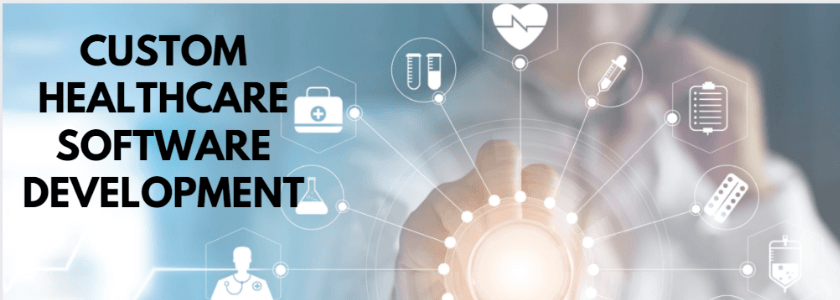
Custom software is typically built by in-house developers and is typically more expensive than off-the-shelf software. Based on functionality, usability, and performance, there is a significant disparity between these new technologies. Custom software for healthcare development can be tailored to your needs depending on your implementation area.
Clients typically request custom healthcare software development when they require a unique solution to one of the following issues:
- Getting the most out of patient records.
- Communication between medical attendants and patients is made easier.
- Ensure that individual health plans and strategies are formed and exchanged smoothly.
- Increasing the accuracy of diagnosis.
- Extra costs are being reduced.
If you anticipate your hospital software will require extensive customization, custom software development is always preferable to off-the-shelf software.
Why Outsourcing Custom Healthcare Software Development a Better Option?
More than 72 percent of organizations prefer software development outsourcing to in-house development, according to Deloitte's Global Outsourcing Survey. Several benefits of outsourcing are as follows:
- Cost-effectiveness: You'll be able to put these dollars toward the development of more crucial domains.
- A greater emphasis on key business procedures: When you don't have to spend time refreshing or polishing your team's talent, you can devote your time and attention to initiatives that will help your firm.
- Increase in productivity has increased and time-saving: Offshore professionals can also help you boost productivity in areas like healthcare app development and website development, saving you time.
- Flexibility: Because outsourcing developers are more flexible and numerous, you can pick to engage with those who meet your requirements.
- Access to global professionals and talent pool.
How Can Terasol Technologies help you in Healthcare Software Development?
We provide high-quality support for the design and development of healthcare software solutions.
It has deep domain expertise in recommending the best solutions to address specific business difficulties and avoiding mistakes throughout delivery and deployment. By referring to us, you may be confident that the solution we give you will last a long time, integrate seamlessly into your digital environment, and manage your data accurately.
Speak with one of our specialists to learn more about the topic and how your company or project may profit from it right away!
